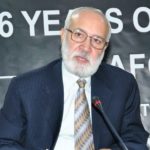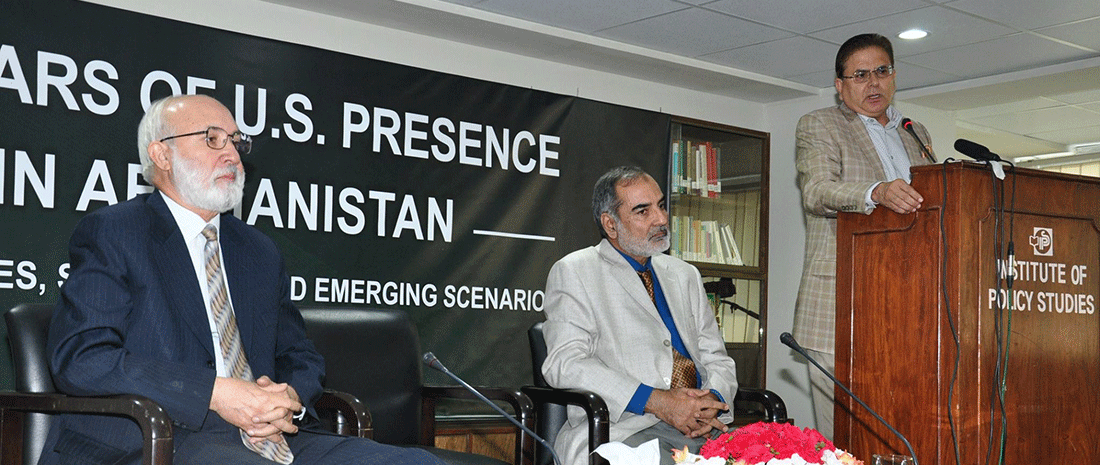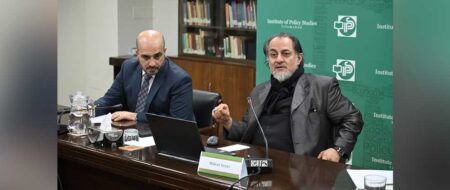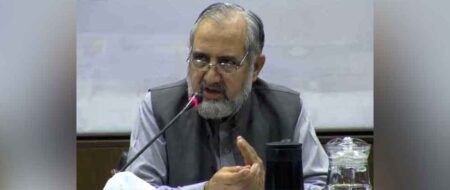16 Years of US presence in Afghanistan
‘Bounties of war much bigger than the dividends of peace’
Terming the present situation of Afghanistan a possibly managed chaos, the speakers at a seminar held at IPS questioned when the war was bringing so much money, why the beneficiaries would want it to stop?
 The session ‘16 Years of US Presence in Afghanistan: Objectives, Strategies and Emerging Scenario’, which was held on October 5, 2017 at IPS, was addressed by Rahimullah Yusufzai, veteran journalist and analyst on Afghan affairs, Ambassador (r) Mohammad Sadiq, former secretary, National Security Division and Executive President IPS Khalid Rahman. The session was attended by a number of analysts, researchers, diplomats and officials of concerned government departments and state institutions.
The session ‘16 Years of US Presence in Afghanistan: Objectives, Strategies and Emerging Scenario’, which was held on October 5, 2017 at IPS, was addressed by Rahimullah Yusufzai, veteran journalist and analyst on Afghan affairs, Ambassador (r) Mohammad Sadiq, former secretary, National Security Division and Executive President IPS Khalid Rahman. The session was attended by a number of analysts, researchers, diplomats and officials of concerned government departments and state institutions.
Talking about the likelihood of America’s future presence in Afghanistan, Amb (r) Sadiq said that the stay will always remain temporary but the duration of that ‘temporary period’ may never be defined. He was certain that the US will continue to stay in Afghanistan either through contractors or through the troops, as in case withdrawal of US led forces, the Afghan armed forces on their own will not be able to take up the war.
Commenting upon the American policies in Afghanistan since its invasion of the country 16 years ago, the speaker said that the only thing consistent about them was the inconsistency. Their objectives were always unknown, resources not managed, and sometimes it even felt that the situation was more like a managed chaos in order to extend the stay longer.
Sadiq said that the ‘unity’ was sorely missing in the Afghan Unity Government. Most ruling elites in Afghanistan had their families and stakes outside the country and would waste no time in escaping abroad if anything goes bad.
He said the Afghan elite class would never also want US to leave because of their high stakes in the chaos, which benefits them. He shared a surprising fact that even the civil society of Afghanistan – which essentially is supposed to be against foreign occupation – supports American presence in the country due to their vested interests.
“When the war brings so much money, why would one want to stop it”, he quoted over the matter.
He viewed that the present situation was not due to the strength of Taliban but because of US’ own flawed policies. It would have been better to address the people who were joining the Taliban out of grievances and not because of the ideology.
Earlier Rahimullah Yusufzai stated that 16 years after the US invasion of Afghanistan there was another military surge taking place in the country after Bush and Obama surges. The strength of US troops has risen up to 11,000 and may go up to 14,000. With the contribution of NATO troops the numbers could rise up to 20,000 and there is much likelihood that the B-52 bombers would return to the war scene. Bombings through air raids in Afghanistan like done in 2001-2 would certainly mean civilian casualties and more sympathies and recruitment for Taliban.
He said that 16 years ago Taliban were apparently defeated within eight to nine weeks but managed to survive and are now strongest ever since losing power. They have gained strength also in northern, western and central Afghanistan where they were traditionally weak. They are still predominantly Pashtun but there are now also Uzbek, Turkmen and Tajik Talibans.
He also claimed that Taliban are no more internationally isolated like before and are now being politically and materially supported by many countries including Russia and Iran.
He further informed that today the casualty figures were highest in the 16-year war as at least 31 Afghan soldiers and police plus nine civilians are killed every single day. Last year 6000 security personnel and 3500 were killed, however only 16 US soldier were among the dead.
He viewed that despite broad consensus that there is no military solution to the Afghan crisis, all sides continue to focus on war than peace. On top of it, the new US policy announced by President Donald Trump in his speech on August 21 is a declaration of a new round of war that has no end in sight. Unfortunately, there is lot more support in US for Trump’s AfPak policy than his other policies. Pakistan ought to take Trump seriously, Yusufzai warned.












